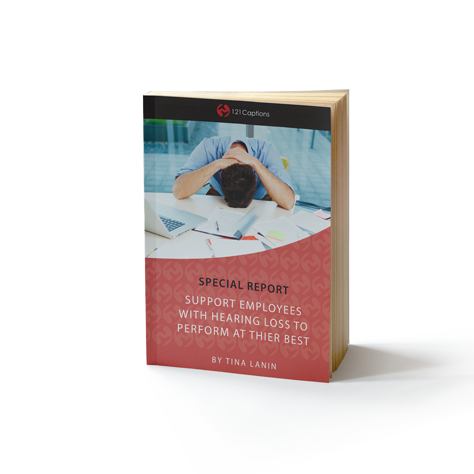What is deaf access like in today’s workplace?
Employers, have you considered the impact of hearing loss in your workplace?
In my experience, ask any deaf person and they will be able to tell you at least one story of how they have been discriminated against at the job interview stage and in the workplace. Discrimination is rife. How can we fix this?
totaljobs have undertaken research which highlights the experiences of deaf employees in the workplace.
Their survey of 437 deaf people found that:
72% received no support finding a job because of their deafness
56% experienced discrimination at work due to their hearing loss
62% from their colleagues
37% during a job interview
53% from management
25% left their job due to discrimination issues
Shockingly, 19% of respondents had not told their employer they have a hearing loss. I can understand why – hearing loss is still seen as a joke, and many people (including employers) don’t know how to react when confronted with hearing loss, how to communicate with a deaf or hard of hearing person, or how to cope with hearing loss in the workplace.
Sadly, discrimination in the workplace can be compounded by a lack of awareness and support from employers. But the benefits of providing this support are obvious. Inclusive employers that engage diverse workforces tap into a broad talent pool with skills, abilities and experience that bring fresh perspective and benefits to the business.
– John Salt, totaljobs group sales director
Deaf access is a learning curve
After I graduated from university with a 2:1 Honours degree in Business Studies with Japanese, I was shocked at how difficult it was to get an interview. I had been upfront about my hearing loss and decided to try a different tactic. I applied to 6 employers and was open about my hearing loss. I applied to another 6 employers and removed all reference to my hearing loss, and gave my parents’ phone number. I sent them all off in the post and waited. I had no response to the first batch of 6 where I was honest about my hearing loss. However, the second batch had the phone ringing, they ALL wanted to speak to me, they were very keen indeed! When my mother told the callers I was deaf and unable to speak to them on the phone, they all dropped me like a hot potato. I then had to become more creative in securing an interview, as I felt that once I got one foot in the door, I would be able to meet people face to face and convince them I was capable of doing the job, despite a hearing loss.
Approximately 14 million people in the UK have some level of hearing loss. That’s 1 in 5 people! This means hearing loss is likely to be an issue for someone in your workplace, whether they declare it or not. Capability isn’t linked to hearing loss, it’s linked to intelligence, skills and experience. Of course, access to education and information impacts on this. But many people still think deaf means stupid, just because we can’t hear – this is not so. We’re deaf, not daft! Please think about this one carefully.
Communication skills are the responsibility of both the employer and the person with hearing loss. Managing hearing loss with confidence can be a minefield as each party is wary of stepping on each other’s toes whilst maintaining respect, dignity and co-operation to ensure an effective working relationship. Education of employers and supportive management is key to a good working relationship between colleagues and the team members with hearing loss. Employers need to be more deaf aware and take positive steps to be more deaf-friendly.
To help facilitate deaf access and awareness within your team, read our Special Report: Support Employees With Hearing Loss To Perform At Their Best.
Deaf awareness and inclusion are vital
It’s very important to address deaf access issues from the outset, from the advertisement right through to working on the job. Here are some issues to think about.
Job Application Stage
If an advert only gives a phone number, how will a person with hearing loss contact the employer? If you promote your organization as disability friendly, such as joining the Two Ticks scheme, or state that you are deaf or disability-friendly, then you will benefit from a more diverse workforce and gain access to some great talent out there.
Interview Stage
The interview process is nerve-wracking for everyone. Imagine being deaf as well, and wondering if you will be able to understand everyone, or if you will get the communication support you have booked. Take as an example, James Blake who went for an interview at a supermarket and they didn’t book the sign language interpreter he had requested – this is not an unusual occurrence.
I know how James felt. I went to an interview at the Royal Hampshire County hospital in Winchester, and had told them I was deaf and lipread. When I entered the room, I discovered it was a group interview and I panicked. They introduced me to the group as “This is Tina, she is deaf and has a learning difficulty.” I was already a bag of nerves. I was totally embarrassed. I was horrified and wanted to just roll over and die. I did correct them, as I don’t have a learning difficulty, but making such a statement about me without my permission was a real shocker. We did a group exercise and we had to figure out how to build something with some of the building blocks missing. I could see the solution straight away, but no one in my group would listen to me, they didn’t want to know. I felt very disempowered. When we did the one-to-one interviews, the interviewer didn’t take me seriously and giggled right throughout our interview. I lost all respect for that team and wouldn’t have worked there if it was the last job on earth. I can’t tell you how angry I was at such appalling treatment, and this from a team working in healthcare!
I went to one interview for a call centre supervisor role and I didn’t tell them I was deaf. Communication support was unheard of in those days, so I had to wing it. I found myself facing a panel of three men. I was horrified to discover I couldn’t lip read ANY of them. I wanted the floor to swallow me up right then and there. I am a very good lipreader but they had faces of stone and they didn’t move their lips enough to enable me to decipher what was being said. I still wouldn’t admit I had a hearing problem, and I tortured myself (and them!) for an hour. This interview still gives me nightmares today, and I am now always upfront about my hearing loss!
How and when a person with hearing loss declares their need for communication support is an important issue to consider. Hearing loss is not an insurmountable obstacle – we just access information differently. Why not ask us how. This issue can be explored sensitively and collaboratively for mutual benefit.
My advice to deaf interviewees is I recommend that you declare your hearing loss before or during the interview. Choosing the timing is crucial, as it depends on how the job was advertised and by whom. Don’t try to hide it. Once you declare this, the employer is legally obliged to make reasonable adjustments. If you feel the employer might be ‘frightened off’ by managing hearing loss in the workplace, then declare it in the interview rather than at application stage – but be positive about it. Offer solutions, not ‘problems’. Explain how you will manage communication in meetings and phone calls, explain Access to Work can support this, and reinforce your ability to do the job – don’t make the interview all about your hearing loss.
Many deaf people think they can’t get communication support for an interview paid for by Access to Work. The fact is that Access to Work can pay for interview support as well as support on the job, however they are slow to approve the support, and the communication support service provider also needs enough notice to enable their service to be booked. More time needs to be allowed to set up appropriate communication support, so employers, do be aware of timeframes when setting up interviews.
In the Workplace
The Access to Work scheme should pay for communication support in the workplace, which should be applied for within 6 weeks of starting a new job. With this support in place (such as an amplified telephone, captioned telephony, speech to text reporter, notetaker, lipspeaker, or sign language interpreter) and good deaf awareness, an employee with hearing loss can do the job just as well as a hearing person. I would point out a deaf employee can work in a better way as we are able to work without distractions by switching off our hearing aid or cochlear implant, and we don’t do small talk around the coffee machine as much as our hearing colleagues.
On the job itself, it all comes down to flexibility and making deaf access to information an easy and workable solution. Here are some suggestions;
- A mentor or work buddy.
- A supportive manager the employee can talk to.
- A regular monthly meeting over a coffee to discuss communication tactics within the workplace.
- Provide meeting agendas in writing, before a meeting takes place.
- Provide information in accessible formats.
- Give employees a mobile number they can text if they need to call in sick.
- Check all information has been understood.
- Deaf awareness training sessions to enhance collaboration and manage expectations.
- Set up a support group. There is a great social support network for professionals in London, Hear Here, which was set up by Harley Street Hearing to do exactly that.
Being supportive and approachable will go a long way to making an employee with hearing loss feel comfortable in your workplace and be able to give their best. Every deaf person is different. Make sure you don’t make any assumptions, and talk to your employees who have hearing loss. It works both ways – when I worked as a careers consultant at University College London, we were always running training sessions and even training each other, so I turned the tables and trained my colleagues on communication skills and how to be deaf aware. They were amazed at how much they learned. I managed their expectations and they knew what to do when I was in the room, setting the tone for our working relationship right from the start.
My deafness led to depression because I always felt left out. Other employees would be standing in groups talking and laughing while I was stuck on tills my entire shift. Even management were guilty. My deafness has got progressively worse over years so too has my bouts of depression. I have worked for quite a few employers over the years and feel it’s worse now than it was years ago.
– Ann, a deaf employee
Communication is everyone’s responsibility. With appropriate guidance and support for both employers and employees, there is no reason why deaf people can’t contribute as much as the next person.
So who’s really losing out here?
totaljob’s full report on deaf access in the workplace: Deaf jobseeker and employee experiences survey report
What has your experience of hearing loss in the workplace been like? Please add to the comments below, so we can all learn from and help each other.
Trackbacks & Pingbacks
-
[…] deaf employees feel is a biggie. Everyone likes feeling important at work. Growing up deaf often comes with isolation, so if you […]
Leave a Reply
Want to join the discussion?Feel free to contribute!






I’ve found the best thing to do is simply not bother. Even when I got to the prized interview stage I was told I wouldn’t be hired due to my hearing loss.
My problem is I have multiple medical conditions as well as being profoundly deaf, so even if I managed to secure a job despite being deaf, my illnesses mean that if I get something like flu or a cold, for others it would mean they can continue to work, for me it means I will be on the sofa for usually about 2 weeks with no energy until I am able to return to work! Unfortunately there is no help for finding work for people with multiple problems, only for one on its own!
They test you like rat lab slavery
Oh oh oh! That’s the best comment I’ve seen this week!
My experience was similar to the article’s author: early in my career, when my resume or application included any reference to my deafness, I got no response. When I put a hearing friend’s number on my resume and had her schedule appointments for me, I promptly got a calendar full of interviews.
Later I would get email from recruiters who would want an interview…via phone and would disappear as soon as they found out I’m deaf.
It was the only way I could get any interviews by removing all items related to being deaf…in all honesty, I think the best approach is to have a representative to visit their local business community to sell them the idea of hiring deaf employees….i firmly believe the problem is they are not educated or not realizing the many potential opportunities the deaf can offer.
I’ve worked for Yahoo for over 7 years, now I’m working on the technical integration of Yahoo and AOL systems since the Verizon acquisition. I’ve been responsible for running the services that image and configure hundreds of thousands of servers around the world. I’m contacted frequently by site operations and engineering teams wanting my help in fixing their problems. I’ve received lots of accolades for my work there. And they still haven’t hired more deaf people. ¯\_(ツ)_/¯
No no no to hearing fraud recuiters, hear misunderstand students, researchers, no more. . You hurt our deaf people. GOHELL. Don’t listen hearing people who lie to all hearing liar stories. TIME TO WAR AGAINST 2 FACED HEARING WHO HATE DEAF ONCE.
I just don’t know more what to do about it my hearing loss, hearing aid didn’t help to much. I really need help with this situation, and I don’t know where to find help
Hi Rosemari, I would recommend going back to your audiologist and ask them for referrals to other specialists or a different hearing aid.
I do not think hearing people hate Deaf. They have not had experience meeting Deaf people, young or old. I worked with a middle school young man as a tutor for math. When he found out I could not hear he wanted nothing to do with me. He was even embarrased to introduce me to his teachers as his tutor. He told me do not sign to him. Only speak. I can speak well because I lost my hearing later. Still, this young man requested a different tutor. The school refused to give him one. He threw temper tantrums and I patiently waited until he was finished with his temper tantrums then went ahead to tutor in math. Later at the end of the year this young man was given an award for improving in his math skills more than anyone in the school year. I was also given an award for increasing this young man’s knowledge from a failing F to a B+. The school principal was astonished I was fully deaf.
Reading this makes me realise how fortunate I’ve been with the support I’ve had throughout education and my working life so far. Sad to say that even in this day and age, I still get challenges that shouldn’t even be there. Me facing those challenges and telling others about it is one way I can help others to learn
Starting pointers for inclusion of persons with a hearing loss in workplace recuitment and on-boarding. Will you review how you communicate (speak, listen and respond) to be more inclusive?
A great article that provides easy ways support to Deaf or Hard-of-Hearing employees in the workplace for little or no cost!
Goed artikel over doven op de werkvloer.
Heel herkenbaar. Al moet ik zeggen dat niet alle punten heb meegemaakt.
Very interesting article.